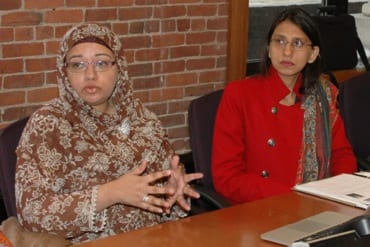Who is a member?
Our members are the local governments of Massachusetts and their elected and appointed leadership.
 The cities of Salem and Springfield and the towns of Arlington and Westwood hosted eight visiting Pakistani government officials, all of whom were women, during the month of May.
The cities of Salem and Springfield and the towns of Arlington and Westwood hosted eight visiting Pakistani government officials, all of whom were women, during the month of May.
The visitors were participants in the U.S./Pakistan Professional Partnership Program, which is funded by a grant from the U.S. State Department’s Bureau of Educational and Cultural Affairs. The program brought six groups of Pakistani officials to Massachusetts over the course of three years.
Visiting Massachusetts, according to the State Department, is beneficial because of the high level of citizen involvement in local government and the access the public has to its elected and appointed officials – not to mention the opportunity to visit a town meeting, perhaps the purest form of participatory democracy in the world.
The host communities were once again the highlight of the six-week stay. Living in Massachusetts communities is a unique opportunity for the visiting Pakistani officials to learn more about the regular lives of Americans and government functions.
A week of cultural activities in Boston included a visit to the State House hosted by Rep. Denise Provost, a session at the Boston Redevelopment Authority, a morning with students at an elementary school in Somerville, a presentation on the SomerStat program by Somerville Mayor Joseph Curtatone, a discussion with students at MIT, and a visit to a service at a local synagogue.
A session with women professionals from the American Public Works Association ended with a lively discussion about women in nontraditional professions.
Despite the fact that Pakistan and the U.S. have played a pivotal role in each other’s foreign policy for years, the distance and sharp cultural differences inevitably lead to some degree of misinformation from both sides. Pakistani participants in this group said that it was enlightening to interact with Americans on a personal basis. They were able to find common ground, break through assumptions, and become more informed about each other’s countries and culture. Most participants – both Pakistanis and Americans – said the exchange was life changing. Given this group’s role as public officials, what they learn here could have a widespread impact back home.
The MMA partnered with the Institute for Training and Development of Amherst to win the State Department grant for the exchange program. The MMA and ITD expressed appreciation to the communities and public officials who opened their city and town halls and homes to this cultural exchange, as they are the reason the program was so successful. On their own time, hosts took the Pakistani visitors to the beach, Martha’s Vineyard, the Boston Ballet, and many cultural activities, including dinners at homes with their families and even having their hair done.
“The hosts showed the visitors that the accomplishments of our government stem from the quality and dedication of our local officials,” said MMA Administration and Finance Director Paul Bockelman, who was the MMA’s program coordinator.